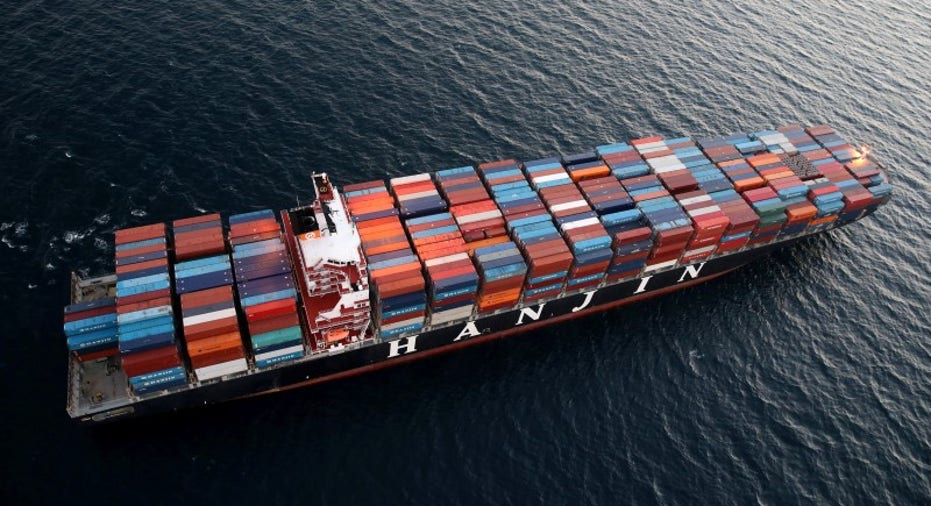South Korea says tough luck to Hanjin as shipping line sinks

SEOUL – The South Korean government, long a bastion of support for the country's big conglomerates, is sticking to its hard-line stance on Hanjin Shipping Co Ltd <117930.KS>, whose collapse is roiling global supply chains.
Since the world's seventh-largest container carrier filed for court receivership in late August, the government has sought to limit the impact on the export-dependent economy and Hanjin customers but is otherwise leaving the company to fend for itself.
"It now is entirely up to the court," a government official closely linked to the matter told Reuters, declining to be named due to the sensitivity of the issue.
South Korea has said no government or central bank money will be directly injected into firms undergoing restructuring in the ailing shipping and shipbuilding industries.
Instead, it has extended aid to small-to-medium sized businesses jolted by the restructuring process, dishing out cheap loans and providing funds to maintain shipbuilding jobs and retrain workers in hard-hit regions of the country.
The government has also taken measures such arranging for rival shipper Hyundai Merchant Marine <011200.KS> and smaller carriers to deploy ships to routes that were served by Hanjin.
In recent months, Korea Development Bank discussed arranging a merger between Hyundai Merchant Marine (HMM), itself under creditor-led debt restructuring. That effort ended when Hanjin sought court receivership after lead creditor Korea Development Bank halted support, Hanjin Shipping executive Kim Hyun-seok said last week.
KDB, which is also HMM's lead creditor, would be willing to back HMM's acquisition of Hanjin assets if it makes business sense and depending on the outcome of the receivership process, a KDB official told Reuters.
"Although we are considering ways to absorb Hanjin Shipping's market share, HMM is currently primarily focused on supporting cargo owners to minimize their difficulties," a spokeswoman for HMM said.
POLITICALLY PALATABLE
The tougher government line with Hanjin marks a departure.
Last year, KDB and the Export-Import Bank of Korea (Kexim) pledged 4.2 trillion won ($3.8 billion) in loans and equity to Daewoo Shipbuilding & Marine Engineering Co Ltd <042660.KS>, the world's largest shipbuilder.
That drew criticism after Daewoo Shipbuilding, which received a bailout some 15 years ago, shocked investors with a first-half operating loss of about 3 trillion won.
Kong Dong-rak, general manager at Korea Asset Investment Securities, said the government's decision was based on the cost of reviving Hanjin, given the high charter fees Hanjin is paying to shipowners and the industry's bleak near-term prospects.
Hanjin had debt of 6.1 trillion won at the end of June.
"The government decided it was time to cut them off because they knew they were sinking," Kong said.
Playing hardball with Hanjin, with just 1,428 employees in South Korea, is easier to do politically than with Daewoo Shipbuilding, which employs 38,000.
"Lazy thinking that the government will have no choice but to help shippers if they run into problems has ended up hurting trading companies," President Park Geun-hye said at a cabinet meeting on Tuesday.
"We will not sit silently by as corporate managements who do not aggressively try to recover their businesses and wait for the government to solve everything," she said.
A Hanjin Shipping spokeswoman declined comment.
Financial regulators blamed the carrier for a lack of information.
"We tried to set up countermeasures for logistics issues which will arise from Hanjin Shipping's court receivership, but we were unavoidably limited as Hanjin Shipping did not respond to any requests from creditors for information about cargo owners and sailing plans," FSC chairman Yim Jong-yong told a parliament hearing last week.
South Korea's trade ministry has been helping cargo owners and exporters, but not Hanjin itself, an official there said.
"All additional help that goes to Hanjin should be limited to supporting the offloading of cargoes. No more," said an official directly involved in discussions with creditors.
($1 = 1,115.3000 won)
(Additional reporting by Joyce Lee and Jane Chung; Editing by Tony Munroe and Lincoln Feast)



















